 Petzlover
Petzlover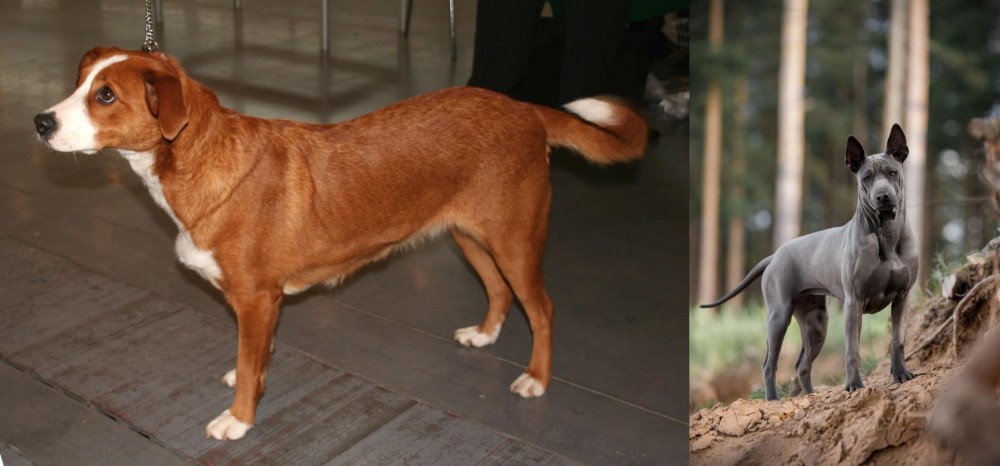 Osterreichischer Kurzhaariger Pinscher is originated from Austria but Thai Ridgeback is originated from Thailand. Osterreichischer Kurzhaariger Pinscher may grow 11 cm / 4 inches shorter than Thai Ridgeback. Osterreichischer Kurzhaariger Pinscher may weigh 14 kg / 30 pounds lesser than Thai Ridgeback. Both Osterreichischer Kurzhaariger Pinscher and Thai Ridgeback has almost same life span. Both Osterreichischer Kurzhaariger Pinscher and Thai Ridgeback has same litter size. Both Osterreichischer Kurzhaariger Pinscher and Thai Ridgeback requires Moderate Maintenance.
Osterreichischer Kurzhaariger Pinscher is originated from Austria but Thai Ridgeback is originated from Thailand. Osterreichischer Kurzhaariger Pinscher may grow 11 cm / 4 inches shorter than Thai Ridgeback. Osterreichischer Kurzhaariger Pinscher may weigh 14 kg / 30 pounds lesser than Thai Ridgeback. Both Osterreichischer Kurzhaariger Pinscher and Thai Ridgeback has almost same life span. Both Osterreichischer Kurzhaariger Pinscher and Thai Ridgeback has same litter size. Both Osterreichischer Kurzhaariger Pinscher and Thai Ridgeback requires Moderate Maintenance.
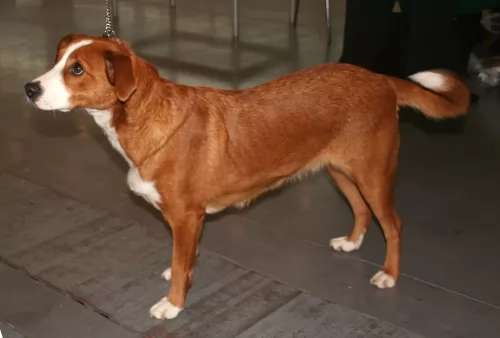 Hailing from Austria, the Osterreichischer Kurzhaariger Pinscher, better known as the Austrian Short-Haired Pinscher has always been depicted on paintings from the Baroque period.
Hailing from Austria, the Osterreichischer Kurzhaariger Pinscher, better known as the Austrian Short-Haired Pinscher has always been depicted on paintings from the Baroque period.
The dog is a terrier-type canine and has always been used as a watchdog but he was also used to hunt because of the terrier qualities he possesses.
This dog has always been used for working on farms. Breeding of this dog started in 1921 and the dog was recognized by the United Kennel Club in 2006.
 Until recently the Thai Ridgeback was not known outside of its native land. However, after being recently recognized as a standard breed, the dogs are getting some notice from the western world. They are one of three known ridgeback breeds with the ridge running the opposite direction of the rest of her fur. The other breeds with this characteristic are the better known Rhodesian Ridgeback and the even lesser known Phu Quoc Ridgeback.
Until recently the Thai Ridgeback was not known outside of its native land. However, after being recently recognized as a standard breed, the dogs are getting some notice from the western world. They are one of three known ridgeback breeds with the ridge running the opposite direction of the rest of her fur. The other breeds with this characteristic are the better known Rhodesian Ridgeback and the even lesser known Phu Quoc Ridgeback.
The Thai Ridgeback is believed to have originated in eastern Thailand but there is no documentation of their actual history. The breed is thought to be descended from the Funan Ridgeback based on a genetic hypothesis. It is thought that the same Funan Ridgeback is an ancestor od the Phu Quoc Dog. This Funan Ridgeback lived over a century ago. Along with the Rhodesian Ridgeback, all have a common ridgebearing ancestor.
It is still unknown where the original ridge came from but it has been shown that all of the ridgeback dogs have the same genetic mutation and even though the Rhodisian is from Africa, there is not a parallel mutation. The Thai Ridgeback is an active, energetic, tough dog. He is loyal, intelligent, and has great jumping ability.
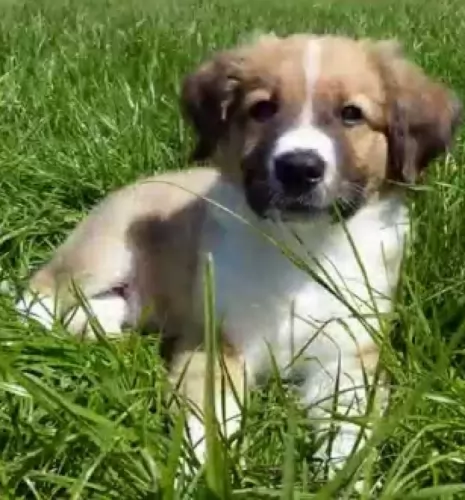 As a medium sized dog, both males and females stand at between 42 and 50cm in height and the dog weighs roughly between 14 and 20kg.
As a medium sized dog, both males and females stand at between 42 and 50cm in height and the dog weighs roughly between 14 and 20kg.
The coat is shortish, dense and smooth and is essentially black and tan with some white, fawn or brindle. The ears of the dog are fairly short and they look as though they wanted to be erect but then decided to be floppy. The nose is black and the eyes dark brown.
The tail is usually docked but when it is left long, it curls over the back. If you want your dog to be bred you can expect between 4 – 6 puppies.
These are playful dogs, getting on well with their human families and wanting to get involved in their activities. They are suspicious of strangers. They are good with kids, making them a good playmate, but they don’t like small children being allowed to climb over them.
They are able to get along well with any other pets in the house. It would be to your benefit to have the dog trained and socialized as he becomes obedient and good around people in social settings. He is an intelligent dog and will find training easy.
They also take their role as guardian and protector seriously.Because he was bred to be a farm dog, he wouldn’t e able to adapt to life on a tiny property in the city.
 The breed is medium in size and muscular in body. They have a wedge shaped head, a short coat that is smooth and pricked, triangular ears. The ridge on his back is pronounced as the hair grows away from the rest of the coat from the hips to the withers. Puppies can be born with or without the ridge. They are extremely agile. With what is often called a sword tail being carried up, the Ridgeback has wrinkles on his forehead, a black tongue or the tongue has black marks, and almond shaped eyes.
The breed is medium in size and muscular in body. They have a wedge shaped head, a short coat that is smooth and pricked, triangular ears. The ridge on his back is pronounced as the hair grows away from the rest of the coat from the hips to the withers. Puppies can be born with or without the ridge. They are extremely agile. With what is often called a sword tail being carried up, the Ridgeback has wrinkles on his forehead, a black tongue or the tongue has black marks, and almond shaped eyes.
The coat sheds minimally and is dense, while the eyes are usually brown – in blue dogs they can be amber. The color of the coat is fawn, red, black or blue with a black mask on the reds. There are 8 different ridge patterns: Feather, violin, saddleback, needle, arrow, bowling pin, lute, and leaf. The broader the ridge the better the dog is considered for show.
There are two epistatic genes that determine the ridge and its size. The more genes of this type the individual dog has, the broader the ridge will be. There must be a dominant gene for the ridge to appear at all.
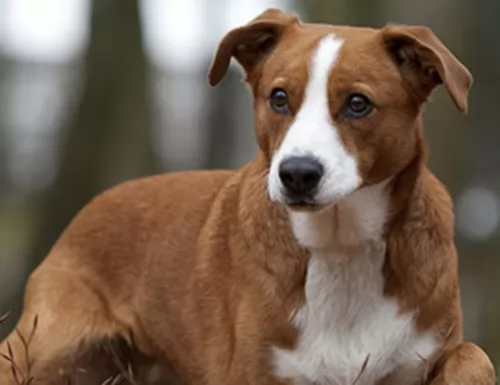 Have your Osterreichischer Kurzhaariger Pinscher trained and socialized if you want him to be amicable and obedient around you and your visitors.
Have your Osterreichischer Kurzhaariger Pinscher trained and socialized if you want him to be amicable and obedient around you and your visitors.
He does well with a human family who are firm, kind and patient with him. He loves to be kept busy with both mental and physical exercise, thriving on challenging activities, and he will become frustrated if he is left day after day just to lie around.
Take him with you on walks, buy him nice chewy, stimulating toys, throw a ball or frisbee with him and include him in your activities.
This is a dog more suited to life in the countryside as opposed to life in the city. Care well for this splendid family pet and you’ll quickly begin to see why dogs like him are known as man’s best friend.
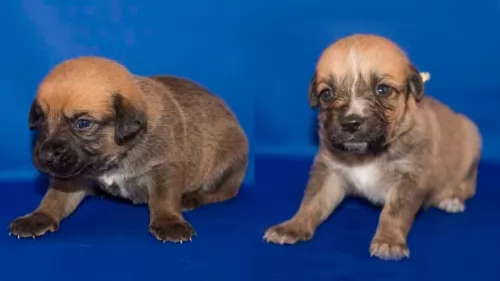 The Austrian Short-haired Pinscher is a robust kind of dog that isn’t going to have you rushing to the vet very often. True, he does have some hereditary health issues but it is highly unlikely that you will find these health issues in your pet.
The Austrian Short-haired Pinscher is a robust kind of dog that isn’t going to have you rushing to the vet very often. True, he does have some hereditary health issues but it is highly unlikely that you will find these health issues in your pet.
Nonetheless it pays to know about one of the more serious conditions -
This is a heart disease that is present from birth and could have been passed down from the parent dog to the puppy. A congenital heart defect occurs as a malformation of any valve, with the most common congenital heart diseases in dogs being patent ductus arteriosus, pulmonic stenosis as well as subaortic stenosis, all potentially inherited defects.
Sometimes a dog can live a fairly normal life with this disease but other times there are complications which can lead to congestive heart failure and atrial fibrillation, causing symptoms such as difficulty with breathing, cough and weakness. Your dog will need to get to the vet to discuss treatment options.
 With such a mysterious origin, there are not a lot of documented episodes of genetic illness as the breed has been isolated in Thailand and natural selection has driven reproduction. There are only a few issues that they are genetically predisposed to. These include:
With such a mysterious origin, there are not a lot of documented episodes of genetic illness as the breed has been isolated in Thailand and natural selection has driven reproduction. There are only a few issues that they are genetically predisposed to. These include:
• Dermoid Sinus – this is a genetic skin condition known as pilonidal sinus as well. This is a defect in the neural tube and the sinus might be removed. If the sinus is wrapped around the spinal cord and cannot be removed it can be tied off.
• Bloat – can be terminal if not treated as soon as possible. Bloat is a distension of the stomach and intestines which can twist and tangle, killing the dog almost immediately without veterinary attention.
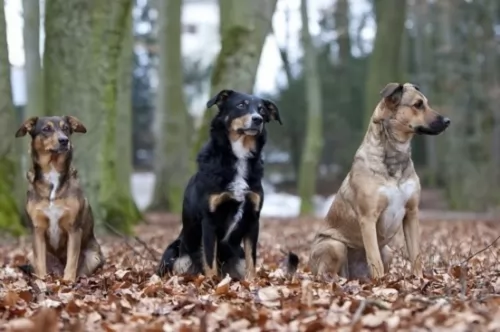 They need quite a lot of exercise, and even though they can adopt to life in the countryside or the city, they will require regular walks, ball- and rope games to prevent them becoming bored, frustrated and destructive.
They need quite a lot of exercise, and even though they can adopt to life in the countryside or the city, they will require regular walks, ball- and rope games to prevent them becoming bored, frustrated and destructive.
The Austrian Short-haired Pinscher sheds quite a bit so he will need to be brushed at least twice a week to remove the loose hairs.
As a medium sized, energetic dog, you want to ensure you maintain your dogs energetic nature by providing him with excellent food.
Choose your commercially manufactured food carefully as some of them are of a poor quality and can actually be detrimental to your dog’s health. Choose a high quality kibble that has quality ingredients.
Home-made food such as boiled chicken, brown rice or pasta and vegetables such as carrots, spinach and sweet potatoes all chopped up and added to his kibble occasionally will do wonders for this dog. He will thrive on also getting in some raw meat from time to time.
Ensure a constant supply of fresh, cool water.
 1. Feeding the Puppy - Don’t over feed the puppy as they are inclined to become obese. Feed a high quality protein rich puppy for medium breeds. Feed in 3-4 smaller meals per day. As he grows be aware of bloat possibilities.
1. Feeding the Puppy - Don’t over feed the puppy as they are inclined to become obese. Feed a high quality protein rich puppy for medium breeds. Feed in 3-4 smaller meals per day. As he grows be aware of bloat possibilities.
2. Feeding the adult dog - The risk of bloat is even greater in the adult and so is the risk of obesity. Don’t feed large meals and don’t feed before or after strenuous exercise. Feed in 2 smaller meals per day.
4. Games and Exercises – Energetic and needs serious exercise. She loves to swim, retrieve, hike, hunt, and catch frisbees. Likes search and rescue and guard dog work.